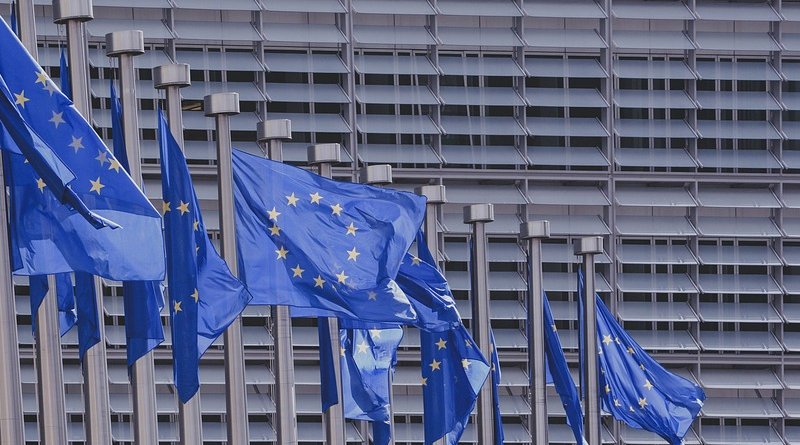EU Should Convey Message To Lebanon, Palestinian Authority To ‘Stay Out’, Israel Envoy Says
By EurActiv
By Alexandra Brzozowski
The EU should use its influence to convey a message to Lebanon and the Palestinian Authority to stay out of Israel’s fight in Gaza, the Israeli ambassador to the EU and NATO told Euractiv on Tuesday (10 October).
“A key issue for us would be that the EU would pass the message to Lebanon and the Palestinian Authority to stay out of this [fight],” Haim Regev said, warning Israel’s neighbours not to join the conflict, which flared up after Hamas Islamist militants unleashed a massive rocket attack on Israel on Saturday (7 October).
Israel retaliated by shelling Gaza, a crowded Palestinian enclave from where Hamas launched its land, air and sea attack, stoking fears of a possible wider conflict in the Middle East.
“We ask the EU and the international community to pass a strong message to both, that our fight is only with Gaza,” Regev said, highlighting the bloc’s leverage as one of the biggest donors in the region.
EU foreign ministers were due to hold an emergency meeting in Muscat, Oman, on Tuesday evening, where a meeting of the EU and Gulf Cooperation Council had already taken place.
Earlier, the EU’s top diplomat, Josep Borrell, said he had invited Israeli Foreign Minister Eli Cohen and his Palestinian counterpart Riyad al-Maliki to join the meeting.
The EU has strongly condemned the attack by Hamas, designated as a terrorist organisation by the EU and the United States, but has sent out mixed messages over the future of its development aid to the Palestinians.
Brussels rowed back on Monday (9 October) from comments made by Neighbourhood Commissioner Olivér Várhelyi that the bloc was immediately suspending “all payments” to the Palestinians.
The European Commission said it was checking if the funding was indirectly enabling “any terrorist organisation to carry out attacks against Israel”.
Emergency humanitarian aid continues to flow to the Palestinians, the bloc said. But EU member states remain split over development aid for the Palestinians.
The death toll in Israel has surged above 900 from the worst attack in the country’s 75-year history, while Gaza officials have reported 687 people killed so far in reprisal bombardments launched by the Israeli Defence Forces.
Israel’s top diplomat in Brussels said Israel has called for international assistance to rescue an estimated 100 civilian and military hostages Hamas kidnapped and took to Gaza.
Israel expects solidarity, ‘maximum pressure’
But Tel Aviv’s expectation from the international community was that “there should be maximum pressure”.
“Our expectation is very simple: 100% solidarity with and support for Israel to wipe Hamas out and to destroy their capabilities – without looking into any kind of a ‘balanced approach’,” Regev said.
Fears of a regional conflagration have surged amid expectations of a looming Israeli ground incursion into Gaza.
“Hamas is a recognised terrorist organisation and there should be no distinction between the political wing and the military wing – they’re the same,” he added.
Having declared war right after the attack, Israel’s focus is to completely disable Hamas’ military capabilities, Regev said.
“They [Hamas] are going to pay a high price for this attack and we cannot allow for it to happen again,” Regev said.
“We will act in accordance with international law, we are warning citizens in the area that we are bombing, but for us, it is clear the situation cannot be the same after what’s going to happen,” he added.
Israel’s top envoy said he could not state whether Iran, a main backer of Hamas, was directly involved in the weekend attacks.
The Wall Street Journal, citing regional sources, claimed in a report that the Revolutionary Guards, the main political branch of the Iranian military, had attended biweekly Hamas planning meetings in Beirut since August, including two also attended by the Iranian foreign minister, Hossein Amir-Abdollahian.
Asked about the potential impact of the war on ongoing talks between Israel and Saudi Arabia to normalise relations, Regev said it was too early to say what impact it could have on the entire region.
The United States has been pressing its traditional ally to sign a normalisation deal with Israel, which would be its biggest diplomatic win in the region, following similar agreements with the United Arab Emirates, Bahrain, and Morocco, known as the Abraham Accords.
However, Riyadh has so far resisted US pressure and linked the move to the creation of a Palestinian state as part of a two-state solution to the Israeli-Palestinian conflict, along with other demands.

